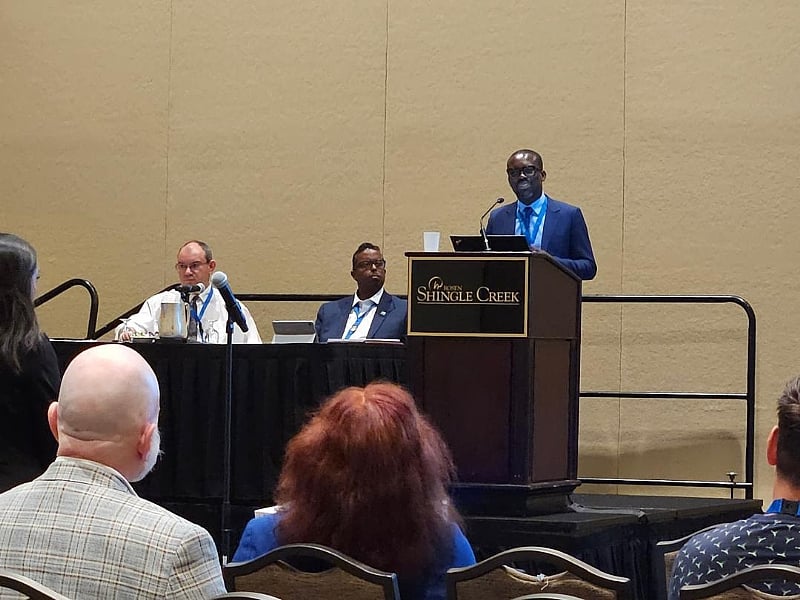Professor Francis Otoo, Acting Director General of Ghana’s Nuclear Regulatory Authority (NRA), advocated for increased international cooperation to facilitate access to peaceful nuclear technologies for African nations. Speaking at the 2025 Institute of Nuclear Materials Management (INMM) annual meeting, he emphasized that nuclear energy is essential for addressing critical development challenges in the Global South, encompassing energy poverty, climate change impacts, food insecurity, and healthcare access. He stressed the importance of Article IV of the Non-Proliferation Treaty (NPT), which focuses on peaceful nuclear cooperation, arguing that it is fundamental to the treaty’s credibility and should be given equal weight to Article III, which addresses safeguards against proliferation. Otoo highlighted existing successful applications of nuclear technology in Africa, including cancer treatment, food security enhancements, water management, and industrial advancements, citing IAEA programs like Rays of Hope and Atoms for Food as impactful examples. He called for increased funding and expansion of such initiatives at the 2026 NPT Review Conference.
Otoo addressed concerns about regulatory capacity in Africa, noting that significant strides are being made to establish robust oversight systems. He cited the Regulatory Cooperation Forum (RCF) and the Forum of Nuclear Regulatory Bodies in Africa (FNRBA) as key instruments for aligning African regulatory frameworks with IAEA standards and preparing for the adoption of advanced nuclear technologies like Small Modular Reactors (SMRs). He further explained that Ghana, in particular, has benefited from collaborations with international partners including the USA, EU, and IAEA, to strengthen safeguards, safety, security, and transparency in its nuclear program. This demonstrates a growing capacity within the Global South to not only utilize nuclear technology but also to manage it responsibly.
Regarding emerging technologies like advanced reactors, Otoo acknowledged both their potential benefits and inherent risks. He underscored Africa’s leadership in establishing the world’s first nuclear-weapon-free zone under the Pelindaba Treaty as a strong foundation for expanding peaceful nuclear programs. However, he emphasized the need for the 2026 NPT Review Conference to address concerns about accessibility, safety, and proliferation resistance of advanced reactors, particularly for newcomer states. This includes removing barriers to access, promoting transparency from supplier nations, and encouraging the establishment of additional nuclear-weapon-free zones globally, thereby respecting national sovereignty while ensuring collective security.
Professor Otoo’s core message revolved around the imperative of balancing the NPT’s dual mandates: preventing proliferation and promoting peaceful nuclear applications. He argued that the treaty’s credibility hinges on the equitable implementation of both Article III, focusing on safeguards, and Article IV, emphasizing cooperation in peaceful uses. He illustrated how nuclear technology is already contributing to positive development outcomes in Africa, including improvements in healthcare, food security, and energy access. He urged the 2026 NPT Review Conference to reaffirm this balance to maintain the treaty’s relevance and effectiveness for all member states.
The upcoming 2026 NPT Review Conference holds significant importance for the future of the global nuclear order, particularly in the context of increasing geopolitical tensions. Developing nations like Ghana are actively advocating for the continued prioritization of peaceful nuclear applications within the treaty framework. Otoo’s call for greater international cooperation and knowledge sharing is crucial for enabling African nations to harness the potential of nuclear technology for sustainable development. This requires addressing regulatory concerns, ensuring equitable access to advanced technologies, and fostering a global environment that supports peaceful nuclear endeavors while mitigating proliferation risks.
The international community faces a critical juncture in determining the trajectory of nuclear technology. Professor Otoo’s arguments underscore the need for a balanced approach that recognizes the legitimate development needs of nations while upholding the principles of non-proliferation. The 2026 NPT Review Conference offers a pivotal opportunity to reaffirm the dual objectives of the treaty and to forge a path towards a future where nuclear technology contributes to global well-being and security. The success of this endeavor will depend on the willingness of all stakeholders to engage in constructive dialogue, address concerns transparently, and commit to meaningful cooperation. This includes developed nations playing a more proactive role in supporting the peaceful nuclear aspirations of developing countries, thereby fostering a more equitable and secure global nuclear landscape.














